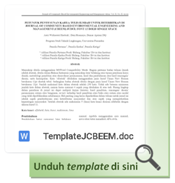FOOD WASTE CONTROL RECOMMENDATIONS IN INDONESIA BASED ON PUBLIC OPINION RELATED TO THE TARGET SDGS
DOI:
https://doi.org/10.23969/jcbeem.v4i1.2334Keywords:
foodwaste, public opinion, recommendation actionsAbstract
Food waste has an impact that can harm or disrupt human life. In Indonesia, food waste management has not been done in an integrated manner. This study was conducted to formulate recommendations for the proper handling of food waste for the people of Indonesia. Formulation of foodwaste management was carried out after collecting and processing data from respondents. Data on conditions and public opinion were obtained from 2 groups of respondents, namely the general public and environmental engineering students from several universities. Cluster analysis, AMOS approach and text mining were ulitzed as methods in data processing and analysis. The results showed that public opinion about knowledge of food waste is quite high. These recommendations for handling food waste are through the habits of food producers, the community as consumers, distribution of food before it expires, processing it into animal feed, processing it into an energy source with anaerobic digestion, and processing it into compost with good cooperation between waste collectors, companies composting and farmers using compost.
Downloads
References
Gustavsson, J., Cederberg, C., Sonesson, U., Van Otterdijk, R., Meybeck, A., 2011. Global Food Losses and Food Waste. Food and Agriculture Organization of the United Nations. Rom. http://www.fao.org/docrep/014/mb060e/mb060e00.pdf
Yustiani, Y.M., Rochaeni, A., Aulia, E. 2019. Konsep Pengelolaan Sampah di Desa Babakan Kabupaten Bandung, EnviroScienteae, Vol. 15, No. 1, pp. 121-126
Salloum, S.A., Al-Emran, M., Monem, A.A., Shaalan, K. 2018. Using Text Mining Techniques for Extracting Information from Research Articles, Intelligent Natural Language Processing: Trends and Applications, Studies in Computational Intelligence 740, pp. 373-397.
Facca, T.M., Allen, S.J. 2011. Using Cluster Analysis to Segment Students Based on Self-Reported Emotionally Intellegent Leadership Behaviors, Journal of Leadership Education, Vo.l. 10, Issue 2, pp. 72-96.
Marini. 2012. Kajian Penggunaan Software AMOS/LISREL berdasarkan Pendekatan TAM, Seminar Nasional Aplikasi Teknologi Informasi (SNATI) 2012.
Hariyadi, H. 2014. Analisa Keterkaitan antara Lingkungan Keselamatan dan Kesehatan terhadap Produktivitas Kerja dengan Metode Structural Equation Modeling (Studi Kasus: PT. Media Karya Sentosa Gresik), Jurnal MATRIK, Vol. XV, No. 1, pp. 55-65.
Brigita, G., Rahadian, B. 2013. Analisa Pengelolaan Sampah Makanan di Kota Bandung, Jurnal Teknik Lingkungan, vol. 19, no. 1, pp. 34-45.
Muhtarom, K. Perilaku Konsumsi Masyarakat Jakarta Timur Sebelum dan Saat Ramadhan, Al-Istishad, Vol. II, No. 2, pp. 55-78.
https://www.news.ucsb.edu/2009/012718/trayless-dining-composting-projects-are-sustainability-successes-ucsb (diakses 31 Januari 2020).
Sato, M., Nakano, M. 2016. Activity of the Food Bank in Japan and Problems based on the viewpoint of Shokuiku Education, Nihon Shokuiku Gakkai Shi, Vol. 10, No.1, pp. 31-40
Paritosh, K., Kushawa, S.K., Yadav, M., Pareek, N., Chawade, A., Vivekanand, V. 2017. Food Waste to Energy: An Overview of Sustainable Approaches for Food Waste Management and Nutrient Recycling, BioMed Research International, Vol. 2017, Article 2370927, 19 p.
Truong, L., Morash, D., Liu, Y., King, A. 2019. Food Waste in Animal Feed with a Focus on Use for Boilers, International Journal of Recycling of Organic Waste in Agriculture, Vol. 8, pp. 417-429.














